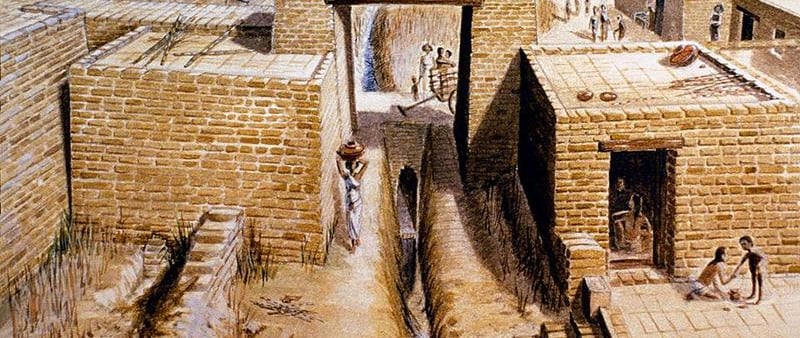🧱 The City of Bricks and Peace : Harappa Governance ✌🏻
Imagine cities that ran like clockwork without kings or castles! 🏙️ Yes, this was the world of the Harappans! These ancient masterminds, with their own writing system, created brilliant city plans, complete with drainage systems that will blow your mind! 🌟 Their peaceful and organized way of life proves that even without kings, a civilization can thrive!
GEOGRAPHY STORIES
10/23/20243 min read


Imagine living in a city with straight roads, houses neatly lined up, and water flowing through drains, just like we have in cities today. But before more than 4,000 years ago, in a place called Harappa, part of the Indus Valley Civilization, people built amazing cities that had all of these things!
Now, let’s explore how the people of Harappa governed or organized themselves. They had something like a government to keep things running smoothly. Just like we have rules in school or at home, the people of Harappa needed rules to keep their cities safe and clean. But we don’t know everything about their government because their writing system (kind of like the alphabets we use today) called Indus script, has not been fully understood yet. But what we do know from the ruins gives us some clues!
The cities were very well planned 🏙️. Imagine straight roads that crossed each other like a grid and houses built neatly along the roads. The people of Harappa even had drainage systems 🚿 that carried away water—that's what I call ancient innovation ! What problem they tried to solve by making drainage systems?
There probably wasn’t just one ruler, like a king 👑. Instead, historians think the people of Harappa may have been ruled by priests (leaders of religious ceremonies) or officials 🧑⚖️, who helped manage things like trade, taxes, and buildings.
In Harappa, people didn’t pay taxes with money like we do today. They probably paid with grain 🌾 or other goods like livestock 🐄. Large buildings called granaries were used to store this grain, which was important during times when food was harder to grow. This helped make sure everyone had enough to eat.
Unlike some ancient cities that built big palaces and temples to show off their rulers or gods, the people of Harappa didn’t build those. This tells us that maybe the leaders weren’t all about showing off how powerful they were. They seemed to care more about making sure the city worked well for everyone, focusing on keeping things fair and peaceful.
The people of Harappa were also great traders 🛳️. They traded things like cotton 🧶, lapis lazuli 💎, and pottery with people far away, like in Mesopotamia (another ancient civilization). They even invented weights and measures ⚖️ to make sure everyone traded fairly. The government probably helped make sure these trades were fair and organized.
What’s surprising is that even though their cities were so advanced, we haven’t found many weapons, and there were no big walls around the cities like in other places. This makes us think that the people of Harappa were peaceful ✌️ and didn’t fight many wars. Maybe they focused more on growing food, trading, and building their cities instead of fighting.
Even though we don’t know exactly how the people of Harappa were governed, we do know they were very smart and worked together to make sure their cities ran smoothly and stayed clean and peaceful. Their drainage systems, granaries, and fair trading are all clues that show how well they organized their lives.
Questions to wonder aloud :
"How do you think the people of Harappa kept their cities so clean and organized without modern machines?"🏙️🧹
"People of Harappa built their houses with flat roofs. What might they have used them for?" 🏠
"How do you think people in Harappa traveled from one city to another without cars or trains?" 🚶♂️🛶
"How do you think Harappan merchants measured and weighed goods to trade fairly without calculators or computers?" ⚖️🛍️
"What kinds of things do you think Harappan children did for fun, and what toys or games might they have played with?" 🧸🎲
"How do you think they built such straight roads and advanced drainage systems thousands of years ago?" 🛣️🚿
"What do you think Harappan people ate, and how did they cook their food without ovens or stoves?" 🍚🍲
"Why do you think the Harappans made their homes out of baked bricks instead of wood or stone?" 🧱
"What do you think Harappans used to light up their homes and streets at night without electricity?" 🕯️🌙
"How do you think people in Harappa communicated or sent messages to each other without phones or letters?"✉️📞
"What kind of clothes do you think people in Harappa wore, and how did they make them without sewing machines?" 👗🧵
"How do you think they got water for drinking, cooking, and cleaning without taps or pipelines?" 🚿🚰
"What do you think Harappan people used to decorate their homes and clothing?" 🖼️👚
"How do you think people kept track of time or seasons without clocks or calendars?" ⏳📅
"Why do you think the people of Harappa traded so much with other civilizations? What kinds of things would they have traded?" 🛳️💰
"How does Indus Script looks like?"
With Montessori joy,
Vanina 😊

